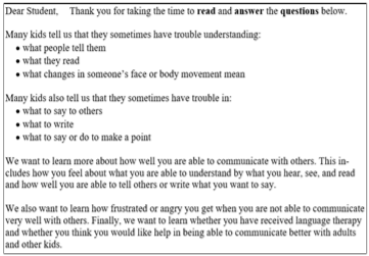
Invention Summary:
Communication and language disorders occur in over 5% of the general population and estimates show them to be more prevalent in youth with psychiatric disorders that require psychiatric services. Early detection in young patients can improve treatment for the communication disorders (CDs) and the additional associated diagnoses.
Description
Comprehensive assessment of CDs is expensive, time-consuming, and is impractical in most clinical settings, particularly inpatient and most time-limited partial hospital programs. Self-report measures rarely focus upon CDs as a symptom, dimensional or categorical area of concern. Few if any self-report instruments provide data for CD screening exist.
Researchers at Rutgers University have created the Communication Perception Estimate Scale (CoPES) to help identify undiagnosed communication disorders. CoPES is based on DSM-5 criteria for CDs and is a set of questionnaires that captures perceived and self-perceived communication difficulties in receptive- and expressive-language and in social (pragmatic) communication for youths between ages 11-18 years.
CoPES is a 30-item scale structured to determine the extent of the following:
- Perception and self-perception of CDs (e.g., Present “Almost all of the time” to “Never” or “maybe once or twice a week”)
- Frustration or anger where CDs exist
- Previous therapy for CDs (yes/no)
- Desire for help (or more help) to improve CDs
Use
The audience for CoPES provide care for children and adolescents, particularly in the areas of health and social services. Examples include the following: mental health and pediatric clinics, programs offering pediatric mental health services including inpatient, and partial hospital programs, therapeutic day school and residential programs, doctors’ offices and schools.
Two hundred youths (ages 11-18 years) receiving psychiatric services in a restricted setting used an earlier CoPES self-report questionnaire. The conclusion of the study was that many youths in restrictive clinical settings report substantial CDs. Youths are aware and able to self-report. The scale appears to be psychometrically sound with a potential to provide a quick and reliable screen for CDs.
Advantages:
- CoPES is a self-report instrument that focuses on and specifically collects CDs screening data
- Has the potential to become a component of diagnosis for CDs and other disorders
- Can help in the treatment of other disorders such as anxiety, depression ADHD, learning disabilities and autism
Three versions of CoPES are available; one for the youth (self-report), another for parents, and a third for teachers.
Intellectual Property & Development Status:
Available through license or distribution agreement.
For information about commercial licenses contact: Andrea Dick